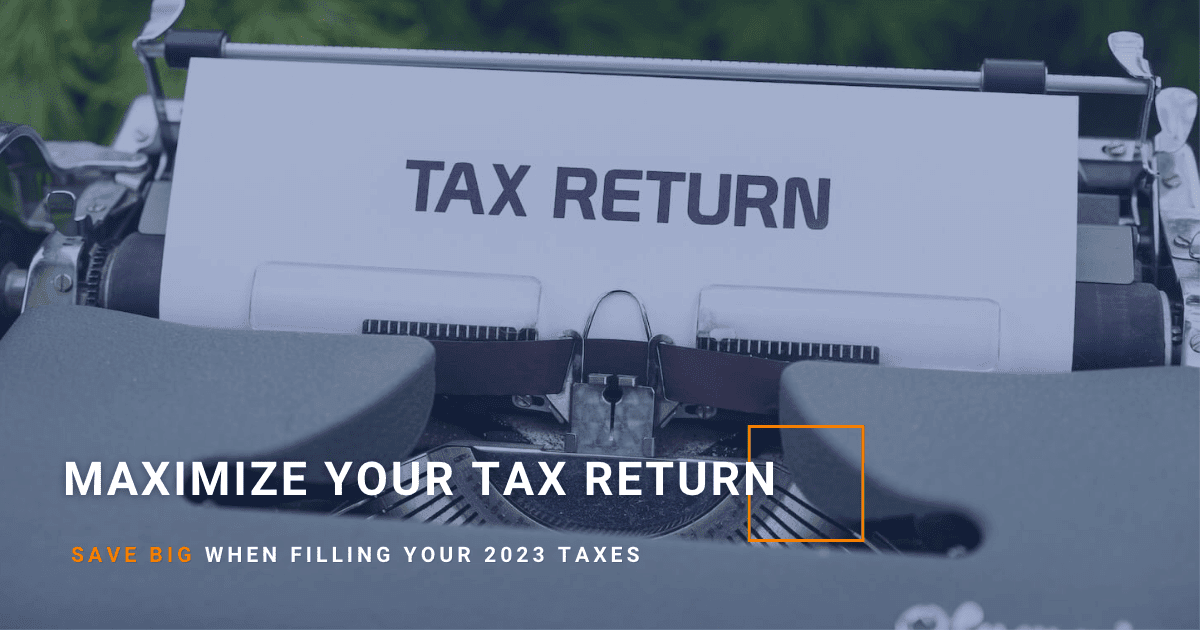Small Business Tax Deductions Checklist
By My Service Depot on Monday, January 9, 2023Save Money When Filing Your 2023 Taxes
Your Small Business Tax Deductions Checklist for 2023
Are you a small business owner preparing to file your taxes? Filing taxes can be complicated, especially if you’re new to the process. Taking advantage of all the deductions available for your business is crucial to make the process easier.
This small business tax deductions checklist can help you do just that. Follow this article to learn everything you can comfortably write off as you prepare to file your 2023 taxes.

What are Business Taxes?
Business taxes are an essential part of running a small business. These taxes are taxes you owe to the government on your business income. It’s vital to be aware of the different types of taxes you may be responsible for, including federal, state, and local taxes. When it comes to filing taxes for your small business, there are a few key deductions you can take advantage of, including deductions for business expenses, debts, donations, and contributions.
What are Small Business Tax Deductions?

Small business tax deductions are expenses you can deduct from your taxable income, reducing the taxes you need to pay. These deductions can come from various sources, including business expenses, operating costs, and investments.
The IRS recognizes two types of deductions for small businesses: those based on personal expenses and those based on business expenses. Personal expenses are the costs associated with running your business, including business meals, travel, and other related expenses. These deductions are based on your income and can help you save on taxes, and business expenses are the costs associated with running your business.
Investments are the costs associated with growing your business. These can include investments in new inventory or investments in research and development. These deductions are based on the amount of money you invest and can help you save on taxes.
Small business tax deductions can help you save money and stay within the law. If you need more help understanding business tax deductions, consider speaking to an accountant or tax specialist, as they can help you understand the different types of deductions available and how they can help you save money.
The Key Areas of Tax Deductions

There are three key areas to consider regarding deductions: deduction rate, tax return, and filing plan. Below is an explanation of each key area to know about before you file taxes for your small business.
Deduction Rate
Your small business tax deduction rate is the percentage of your total income you can deduct from your taxable income. The higher your deduction rate, the more money you can write off and the more money you can save on taxes. The deduction rate varies based on your business structure and the type of income you earn. Sole proprietorship and single-member LLCs are generally taxed at the individual rate, which is the same as your income tax rate. Multi-member LLCs, C-corporations, and S-corporations are generally taxed at a corporate rate, typically lower than the individual rate.
Tax Returns
Your small business tax return will list all the deductions you’ve taken throughout the year. It’s essential to ensure that all your deductions are accounted for so you can get the maximum benefit from your tax return. The most common deductions for small businesses include the following:
- Business expenses such as office supplies and furniture, equipment, and travel
- Business use of a home office • Employee wages and benefits • Interest on business loans
- Insurance premiums
- Charitable contributions
- Business-related educational expenses
- Depreciation of business assets
- Self-employment tax
Filing Plan
Once you’ve determined your deduction rate and accounted for all applicable deductions, it’s time to create a filing plan. Depending on your small business structure, you may need to file quarterly estimated taxes or a single annual tax return. You’ll also need to decide which type of tax form to use. Generally, sole proprietors and single-member LLCs will file a Schedule C to report their business income, expenses, and deductions. Multi-member LLCs, C-corporations, and S-corporations will use Form 1120, 1120-S, or 1120-C to report their business income and expenses.
What are Write-Offs?
A write-off is an expense or portion of an expense you can deduct from your taxable income. A write-off reduces your taxable income, meaning you pay less in taxes. Write-offs can be used for various expenses, from business travel costs to the depreciation of office equipment and inventory.
Each type of write-off has its own set of criteria and rules that you must meet to qualify for the deduction. For example, if you are self-employed or working from home, you can deduct expenses related to your home offices, such as required technology, paper, and additional office supplies. You can deduct certain payroll expenses and office supplies if you have employees.
Researching and ensuring you are taking full advantage of all the available deductions is essential. Ensure you understand the criteria and rules you must meet to qualify for the write-off. This process will guarantee that you are taking the proper deductions and not putting yourself at risk of being audited by the IRS.
Tax Deductions for Small Businesses

When filing taxes for your small business, various deductions are available to you. Below is a list of tax deductions for small business owners, followed by in-depth explanations for each deduction.
- Business Expenses
- Debts
- Bank Fees
- Donations and Contributions
- Costs of Goods and Services
- Advertising and Marketing Expenses
- Real Estate Costs
- Business Insurance
- Contract and Freelance Labor
- Software Subscriptions
Business Expenses
First, let’s talk about the business expenses eligible for tax deductions for small business owners. Generally, you can deduct any expense considered ordinary, necessary, and reasonable from your tax return. Most business expenses, such as rent or mortgage payments, employee salaries, supplies, and travel, can be deducted.
The next step is to calculate the deductions. To do this, you must first determine the total amount of the deductible expense. Then, calculate the percentage of the expense that is deductible. For example, if you spend $2,000 on rent and the rent is 75% deductible, you can deduct $1,500 on your tax return.
Once you’ve calculated the deduction, you’ll need to keep track of the details. Tracking includes keeping receipts and other documentation for any deductible expenses and creating a spreadsheet or other system for tracking deductions.
Finally, keep track of any changes that may affect your deduction. For example, if you start a new business or make significant changes to an existing one, you may be entitled to additional deductions.
Debts
Debt and loans can often be a significant burden on small businesses. Understanding how you can save money on your taxes by taking advantage of deductions for business debts and loans is crucial. Below are a few ways to make the most of your tax deductions.
- Interest in Business Loans. When you take out a loan for your business, the interest you pay on that loan is tax deductible. This deduction applies to both secured and unsecured loans. Remember that the deduction amount is limited to the interest paid during the tax year.
- Business Credit Card Interest. If you have a business credit card for business expenses, the interest you pay on that card is also tax deductible. The same rules apply – the deduction amount is limited to the interest paid during the tax year.
- Business Debt Forgiveness. You might be eligible for a deduction if you have business debt that is forgiven or settled for an amount less than what you owe. This deduction applies to both secured and unsecured debt. The deduction amount is limited to the debt forgiven or settled.
- Business Loan Points. When you take out a loan for your business, you may be required to pay “loan points.” Loan points are the fees paid to the lender at the time of the loan. These fees are tax deductible and can provide significant savings on your taxes.
- Business Loan Repayment. Your payments are tax deductible when you repay a business loan, including secured and unsecured loans. The deduction amount is limited to the number of loan payments made during the tax year.
Bank Fees
Bank fees are necessary for running a small business, but fortunately, most are tax deductible. Small business owners can write off a portion of their banking costs when filing their taxes. Understanding which bank fees are deductible and how to claim business expenses on your taxes is essential.
The first thing to understand is that not all bank fees are tax deductible. Generally, any fees related to the processing or transfer of funds, such as wire transfer fees, are eligible for the deduction. However, fees associated with other services, such as overdraft fees, are not eligible.
To claim the deduction, you’ll need to track your bank fees throughout the year with detailed records of your banking costs, including the type of fee, the amount, and the date you paid it. This information will be needed when filing your taxes. When filing your taxes, you’ll need to use IRS Form 1040 and include your bank fees on line 22. This line is specifically for business deductions, so it’s essential to make sure that you list all of your bank fees here.
It’s also important to remember that you can only deduct a portion of the bank fees related to your business. If you have a personal account at the same bank and you’re paying fees on both accounts, you can only deduct business fees.
Finally, you’ll need to file your taxes promptly. Bank fees deducted in the current tax year must be reported on the tax return for that year. If you take too long to file, you won’t be able to claim the deduction.
Donations and Contributions
One of the most overlooked deductions is donations and contributions to charities and organizations. Your small business may be eligible for a tax deduction when you donate or contribute to a charity or organization. This deduction is based on the donation amount, the type of charity or organization, and the type of donation.
It’s vital to note that you must itemize your deductions to take advantage of this deduction. To be eligible for tax deductions, the charity or organization must qualify as a 501(c)(3) organization as defined by the IRS. These organizations include religious, charitable, scientific, literary, or educational organizations and can also include organizations that work to prevent cruelty to animals or children.
The type of donation also matters. Cash donations are the most common form, but other types may also qualify. For example, you can donate clothing, furniture, books, or other household items. You must keep detailed records of the items you donate, including their value and the date of the donation.
You can also donate services or volunteer time to a charity or organization. For example, if you donate your time or skills to a charity or organization, you can deduct the value of your provided services.
Keep detailed records of all donations and contributions, including the name of the charity or organization, the amount of the donation or contribution, and the date. It’s also essential to ensure the charity or organization qualifies as a 501(c)(3).
Cost of Goods and Services
As a small business owner, you must stay up-to-date with all the tax regulations and laws to ensure you take full advantage of all available deductions. One way to do this is by closely examining the costs associated with producing goods and services and utilizing them to get tax deductions.
The first step is to identify the costs you incur when producing goods and services. Small business costs can include materials, shipping, and more. Once you’ve identified these costs, you can start exploring how to use them to get tax deductions.
For example, many materials used in production may be eligible for tax deductions. These deductions can include the cost of raw materials, machinery, inventory, equipment used in production, and tools needed to produce the goods or services. The cost of shipping materials to and from production sites and any storage costs associated with the production process can be deductible.
Furthermore, overhead costs, such as rent, utilities, and insurance, are often deductible. These costs are essential to the production process and can be used to get deductions. Any costs associated with the sale and delivery of goods and services can also be deductible, including shipping and handling fees, packaging, and any credit card fees. By taking the time to identify and understand the costs associated with producing products and services, small business owners can save money when filing taxes.
Advertising and Marketing Expenses
Small businesses often deduct advertising and marketing expenses, meaning you can deduct from your taxes the costs associated with advertising and marketing, such as online or print ads, website design, and professional photography. Additionally, you can deduct advertising expenses like logo designs, uniforms, vehicle wraps, company swag, business cards, ad space, web design maintenance, domain registration, holiday cards, and event sponsorships.
Any advertising or marketing expenses are ordinary and necessary to qualify for a deduction from the IRS. For instance, your advertising and marketing expenses must be related to the business and must be necessary to keep the business running. Maintaining detailed records of all expenses related to advertising and marketing is vital, as these costs can add up quickly.
When filing taxes, you can deduct advertising and marketing expenses in a few different ways. The first way is to deduct the entire expense in the year it occurred, therefore deducting it in the same tax year you paid for it. The second way to deduct advertising and marketing expenses is to spread the deduction over the years, meaning you can deduct a portion of the expense in the current tax year and the remaining portion over the next few years.
This option is helpful for small businesses that want to spread the cost of advertising and marketing over a few years, as it allows them to get a tax deduction for each year in which your business incurred the expense. Finally, small businesses can deduct any advertising and marketing expenses related to networking events or conferences.
Costs Spent for Business Real Estate
Any business owner who owns or leases property for their business can write off these costs. The deduction amount depends on the property type and use, but it can amount to significant savings. The most common type of real estate costs that can be deducted is those associated with purchasing or leasing business premises. These deductions include the cost of the property itself and any improvements or repairs made to the property. It also includes fees or taxes associated with the purchase or lease, along with moving expenses if you are switching or building company property.
For businesses that lease their premises, the deduction amount depends on the lease’s length. Generally, businesses can deduct the entire cost of the lease in the year it was incurred. However, if the lease is for more than one year, the deduction must be spread out over the lease period.
Businesses can also deduct the cost of property taxes, insurance, and utilities associated with the property. However, it would be best if you allocated these costs between the cost of the property and the cost of the improvements or repairs. For example, if the property taxes are $1,000 and the cost of the improvements or repairs is $500, the business can deduct $500 for the property taxes and $500 for the improvements or repairs.
Another type of real estate cost that may be deductible is depreciation. Depreciation allows businesses to deduct a portion of the property’s cost over time through amortization rather than taking the entire deduction in the year your business incurred the cost. Small business owners can also deduct the cost of any legal or accounting fees associated with the purchase or lease of the property, including fees for appraisals, surveys, or title searches.
Money Spent on Business Insurance
Business insurance is crucial to protect your business from possible financial losses due to unforeseen events, and it is also a great way to save money on taxes. Depending on your type of business and coverage, you can deduct the total cost of your business insurance premiums from your taxable income.
For example, if you own a store, you can deduct the cost of property insurance. Property insurance covers the physical structure of your business, such as the building and its contents. This type of insurance can be costly, but it is also a great way to save money on taxes.
The cost of the insurance premiums can be deducted from your total taxable income, which can significantly reduce your overall tax bill. If you are the sole proprietor or independent contractor, you can deduct the cost of liability insurance. Liability insurance covers your business in the event of a lawsuit or other legal action related to your business activities. This type of insurance can also be expensive, but it may be deductible from your taxes.
You can also deduct the cost of health insurance for yourself and your employees. Health insurance is a critical way to protect your business from financial losses due to illness or injury. Finally, you may deduct the cost of workers’ compensation insurance. This insurance covers your employees in the event of an injury or illness related to their work.
Costs for Contract and Freelance Labor
Contract labor costs are the costs of hiring an independent contractor to perform specific services for your business. These services include payments made to the contractor, such as salary, wages, or bonuses. It also includes any reimbursements for expenses incurred by the contractor while working on your project. The cost of contract labor can be deducted as an itemized business expense on your tax return.
Similarly, freelance labor costs are also deductible as itemized business expenses. Freelance labor costs include any payments made to a freelancer for services rendered, including their rate of pay, travel expenses, and any other costs related to their work for your business.
Take Advantage of Software Subscriptions
For small business owners, there are a variety of software subscriptions that are eligible for tax deductions. Section 179 of the IRS tax code covers field service software platforms like Smart Service. Section 179 allows small businesses to deduct the entire purchase price of equipment or software purchased during a tax year, such as Smart Service.
Software applicable for tax deductions must help your organization make money and be available to the public. While custom software is not applicable under Section 179, platforms like Smart Service apply.
Find Out More With Smart Service

Saving money is essential for small businesses navigating the process of filing their yearly taxes. By understanding what parts of your business are eligible for tax deductions, you can save significant funds to encourage business growth.
Software like Smart Service is ideal for small businesses seeking advice and guidance on building their business while saving money on taxes. Businesses in the field service industry can use Smart Service and platforms like QuickBooks Pro, Premier, Online, and Enterprise to streamline their business operations and identify tax-deductible operations. Learn more about your tax deductibles today by getting started with Smart Service.


